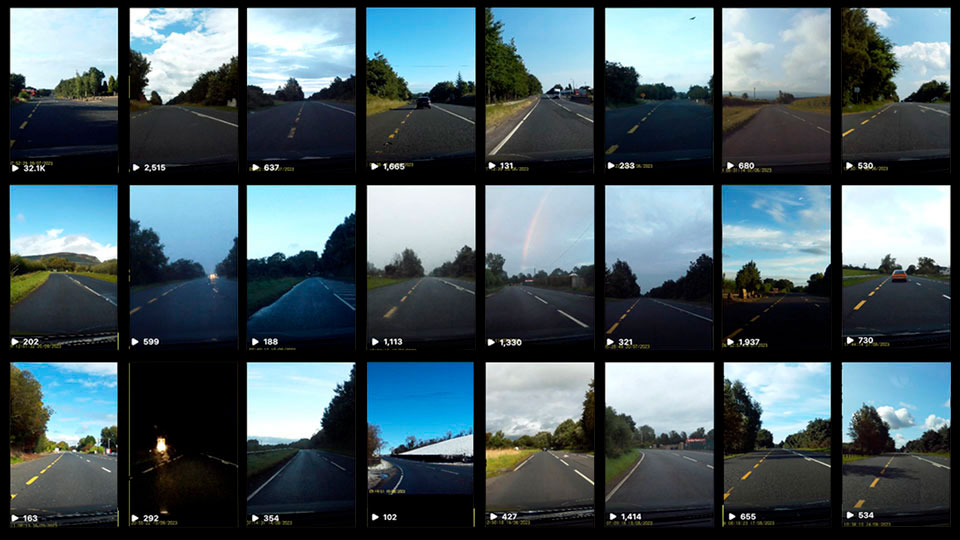
This panel discussion is related to the Memorial/Unmemorial film installation that can be viewed in Belfast Exposed between 11am and 5pm from Tuesday 1st March to Saturday 23rd March (closed Sundays and Mondays).
Artist Gwen Stevenson embarked on a poignant year-long durational performance, marking the 25th Anniversary of the Good Friday Agreement. From February 14, 2023, to February 14, 2024, Stevenson daily crossed the UK/Ireland Border, reciting the names and ages of those whose anniversaries of death, fatal injury, or disappearance coincided with each date.
Titled Memorial/UnMemorial, the work intricately contrasts remembrance and memorialisation in Northern Ireland’s contemporary context, serving as both a memorial and an ‘unmemorial’, it challenges the necessity or absence of a collective memorial, inviting viewers to contemplate complexities.
The film, a culmination of this durational journey, utilises daily footage and a soundtrack, allowing visitors to engage with the profound narrative at their own pace, prompting reflection on the enduring legacy of conflict and the profound impact of memorialization.
Belfast Exposed, renowned for showcasing thought-provoking narratives and visual stories, provides the ideal backdrop for Memorial/UnMemorial. The institution’s commitment to inclusivity, engagement, and amplifying diverse voices aligns seamlessly with the essence of the film.
Belfast Exposed’s dedication to truth-telling and confronting challenging realities echoes in the daily recitation of names and ages, emphasizing the universal impact of conflict on individuals. This mirrors their commitment to unearthing untold stories, shedding light on the “persistence of the present past”, as eloquently described by Declan Long (Ghost-Haunted Land, Manchester University Press, 2020, p.201).
Delving into the poignant narrative, the screening at Belfast Exposed, Donegall Street, holds particular significance, marking amongst others, the anniversary on 20th March of the Donegall Street bombings in 1972, that killed seven people and injured 148.
The intentional choice of Valentine’s Day underscores the shared belief that every individual is a ‘loved one’ transcending perceived victim hierarchies. In this collaboration, Memorial/UnMemorial becomes not just a film screening but a dialogue between the past and present, an ode to remembrance and a questioning of collective memorialisation, mirroring Belfast Exposed’s commitment to stirring conversations around complex narratives.
As the film unfolds at Belfast Exposed, viewers engage at their own pace, reflecting the institution’s ethos of encouraging individual exploration. This collaboration seeks to create an immersive experience resonating with Belfast Exposed’s values of cultural enrichment, social understanding, and artistic expression.
Memorial/UnMemorial at Belfast Exposed is more than a screening; it’s a convergence of narratives, a testament to shared values, and an invitation for the audience to reflect on the ongoing legacy of conflict. Together, bridging the gap between individual stories and collective history, creating a space where the visual narrative becomes a catalyst for understanding, dialogue, and collective remembrance.
A panel discussion including Dr Gail Ritchie, Dr Paul Mullan and Gwen Stevenson, exploring the themes of Memorial/UnMemorial will be hosted by Deirdre Robb, Chief Executive of Belfast Exposed, in Gallery 1 on Thursday, 21st March 2024 at 6:00pm.
Dr. Gail Ritchie
Gail is a professional visual artist and researcher based in Belfast, Northern Ireland. She was born in Newtownards, County Down. Gail studied art and design at Ulster University (BA Hons. 1991) and at Queen’s University (MA Arts Management 2013). In 2022 she was awarded a PhD in International Relations from Queen’s University Belfast for practice-based research into how the Northern Ireland Troubles might be commemorated in material form. She has been a studio holder of Queen Street Studios (QSS) since 2003 and has served both as a Board Member and Chair. During this time she co-led projects which enabled the group to relocate twice to improved premises. From 1995 to 2003 Gail lived in the Republic of Ireland and she was a member of Backwater Artists Group Cork.
She has received awards from Arts Council Ireland, Arts Council Northern Ireland, Cultural Relations Committee, the British Council and the Arts and Humanities Research Council. Most recently she received the Basil Chubb Award from the Political Studies Association of Ireland for her practice-based thesis The im/material monument. She continues her speculative research into time, memory and memorials from her studio in East Belfast.
Dr. Paul Mullan
Dr. Paul Mullan is Northern Ireland Director of The National Lottery Heritage Fund and is an Honorary Professor of Practice at Queen’s University Belfast and a Visiting Professor at Ulster University. He has been involved in a variety of heritage, tourism and conservation projects, and has written, lectured and broadcasted on heritage matters. He studied at Queen’s University, Trinity College Dublin, and Ulster University. In 2021 he obtained his doctorate looking at how the past is remembered in a divided society. He also has an MBA.
He has sat on a variety of Ministerial Advisory Groups including the recent Culture, Arts and Heritage Taskforce. He is also a member of the Irish Government’s Expert Advisory Committee on the National Inventory of Intangible Cultural Heritage. He chairs the Decade of Centenaries Roundtable which supports civic and community organisations to navigate how the past is remembered.
Gwen Stevenson
Gwen Stevenson has an award-winning visual-arts practice and is recognised for her immersive interactive installations, experimental films, and site-specific durational performances. Her focus lies in exploring the impermanence and fragility of life, particularly in the aftermath of the Northern Ireland conflict and amidst the challenges posed by the climate emergency. With a diverse background, her socially engaged practice spans site-specific and community contexts in Northern Ireland, encompassing public health, arts in health, regeneration, peace-building, arts and disability, youth arts, community arts, arts for older people, and intercultural arts initiatives. The tangible outcomes of her engagement include public art pieces, events, exhibitions, site-specific installations, short films, and publications within cultural, community, and education spheres.
Gwen Stevenson’s recent accolades include the Arts Council of Northern Ireland Individual Digital Evolution Award and Future Screens Narrative Futures Award. Notably, she represented Ireland at Estudio Abierto in Buenos Aires, South America’s premier contemporary arts festival.
Share: